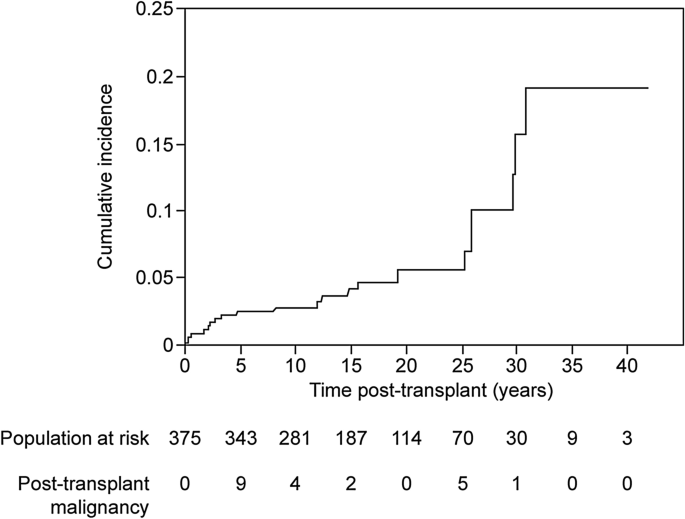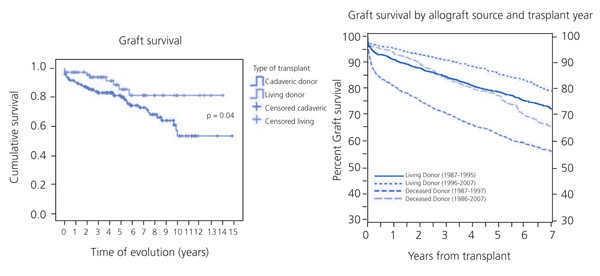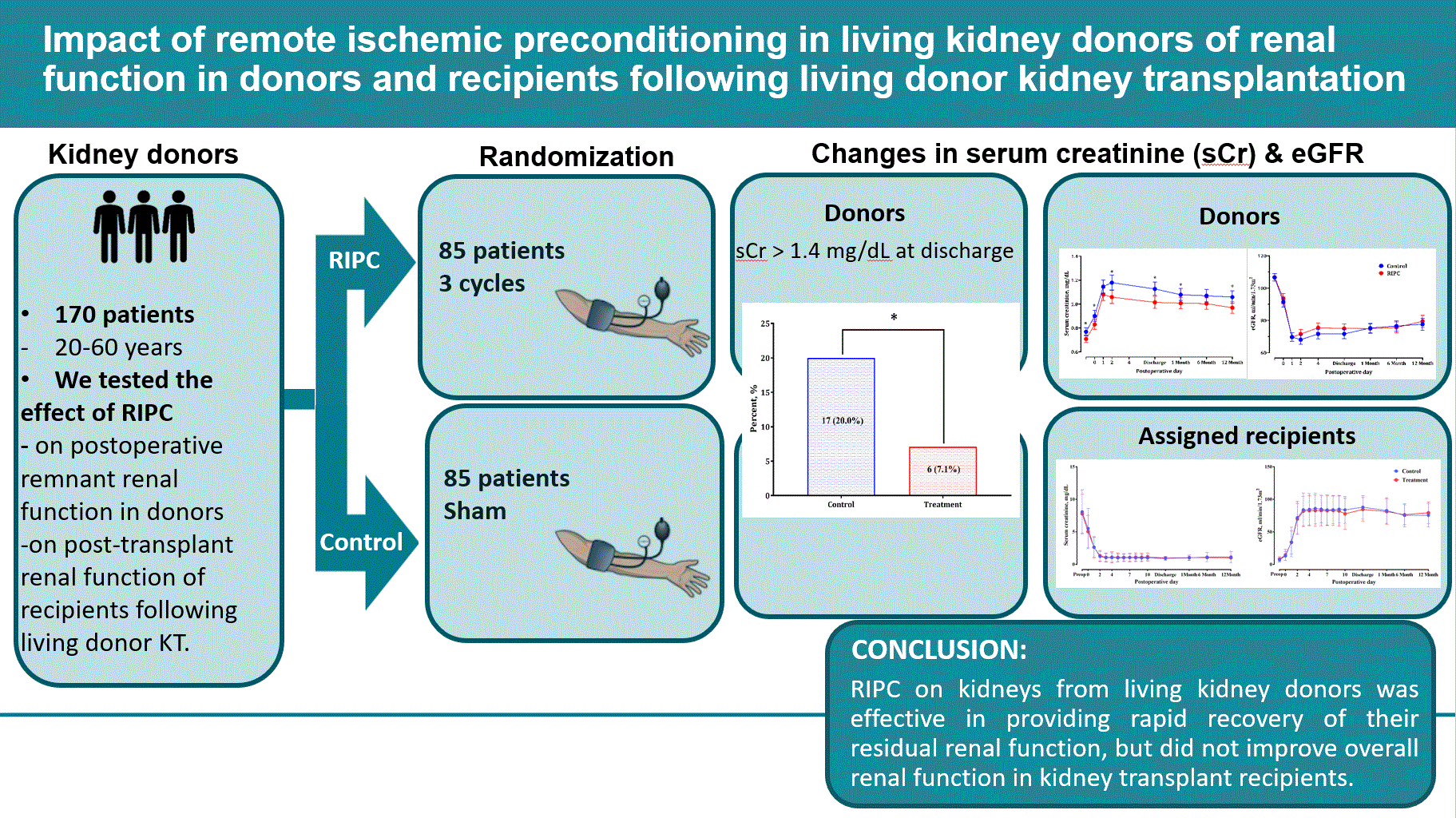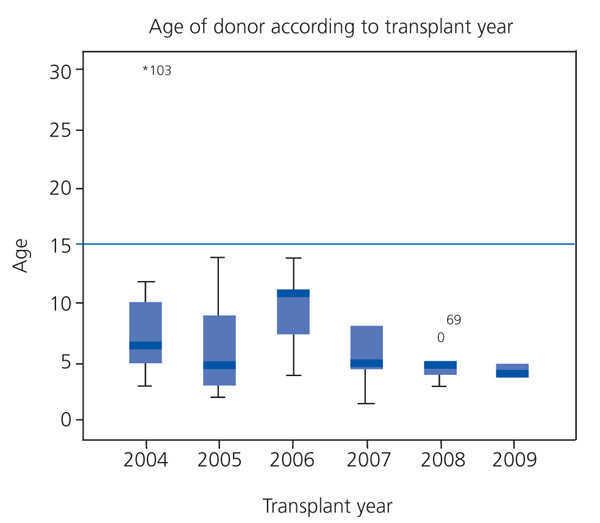child kidney transplant life expectancy
However it is important to remember a transplant is a treatment for kidney disease not a cure and you will need to take. Acute rejection usually happens soon in the months after a transplant.

Living Kidney Donation Is The Best Option For Those In Need Of Kidney Transplants Here Is A Handy Tip Sheet W Kidney Donation Living Kidney Donor Kidney Donor
The life expectancy benefit of transplantation over dialysis may be as much as 2530 years 1.

. Significantly decreased or no urine output. Thats right kidneys dont last forever after transplant. For a 60-year old woman stage 1 life expectancy is 18 years while stage 2 is only one year less.
The majority of patients 75 will live at least 5 years after a liver transplant. How long transplants last. When your kidneys fail treatment is needed to replace the work your own kidneys can no longer do.
Patient survival is excellent following kidney transplantation in children 9095 at 10-years Long-term kidney transplant outcomes are dependent on excellent adherence to follow-up and immunosuppressive regimens. As long as the donor is evaluated thoroughly and cleared for donation he or she can lead a normal life after the surgery. While these outcomes benefit their overall quality of life these children will nonetheless navigate a future of clinical and personal challenges.
33 suggested that this period ranged between 100 and 200 days for ECD transplant recipients. A living donor kidney functions well for almost 15 to 20 years while with a deceased donor kidney life expectancy increases from 8 to 12 years. Children will therefore need two or more kidney donations in their lifetime.
People can live normal lives with only one kidney. Some signs of kidney transplant rejection include. When the kidney is removed the single normal kidney will increase in size to compensate for the loss of the donated kidney.
Getting a kidney transplant can feel like having another chance at life. Pancreas and kidney 32 years. Life expectancy at various ages at transplant was calculated from the estimates of risk of death.
More than half 543 or 183337 of the pediatric transplant patients in the study group survived at least 15 years past surgery. How long transplants last. And 12 to 20 years when its a live donor.
A kidney transplant is often the treatment of choice for kidney failure compared with a lifetime on dialysis. 35 who compared the survival of kidney transplant recipients 70 years of age with age-matched wait-listed transplant candidates and. Overall graft survival is somewhat better when the kidney is.
Considerable swelling of hands eyelids or legs. Unfortunately this means that the other half have returned to dialysis and require a second transplant during childhood or adolescence. Younger adults with kidney problems benefit the most from a kidney transplant procedure but even people as old as 75 gain around five more years after a transplant surgery than if they had stayed on dialysis.
There are two types of treatment for kidney failure. Pancreas alone 24 years. Kidney transplantation and donation in children.
The maximum loss for males transplanted from HLA-identical siblings was about 10 years. The researchers found that of those 15-year survivors 825 151. Fever more than 100 F or 38 C with or without chills.
A kidney transplant can treat chronic kidney disease or end-stage renal disease to help you feel better and live longer. In making a decision about whether this is the best treatment for you you may find it helpful to talk to. Tenderness or pain over the transplanted area.
Kidney transplantation is a treatment option to improve your childs quality of life and increase overall life expectancy. On the other hand I tell patients that they can expect on average 14 to 16 years of function from a kidney that comes from a living donor. When combined with a kidney transplant about an 11-year graft half-life.
These results have been confirmed in a more recent study by Rao et al. Life expectancy for patients transplanted at that age was about 42 years. The goal of kidney transplantation in children is to provide a duration and quality of life similar to their healthy peers.
Compared with dialysis kidney transplant is associated with. Child kidney transplant life expectancy Monday April 25 2022 Edit On the other hand I tell patients that they can expect on average 14 to 16 years of function from a kidney that comes from a living donor. For stage 3 kidney disease her life expectancy would be 11 years.
Better quality of life. Half of children who have received transplants still have a functioning kidney graft 14 years after transplantation. A kidney transplant for children today compared to dialysis offers a longer life expectancy superior growth and improved neurocognitive development and academic performance.
Our results are in contrast with those reported in the literature. More than 40 years. It means that a person born with kidney failure like Zack is very likely to go through several kidney transplants through their lives.
It has been shown that kidney transplantation results in superior life expectancy and quality of life compared with dialysis treatment for patients with end-stage renal disease. Lower risk of death. However kidney transplantation in children differs in many aspects from adult kidney transplantation.
About 8 to 12 years for a when the donor is deceased. November 3 2021. There are many great things that come after a transplant like having better health and more freedom to do the things you enjoy.
Treatment Options Transplant Living donor types Related such as a parent brother sister aunt or uncle Unrelated such as a. In short women have a slightly greater life expectancy at all ages. But during stages 4 and 5 those advantages slip away and life expectancy becomes essentially identical.
As a leader in pediatric kidney transplantation our one-year survival rate for both living-related and cadaver kidney transplant recipients is 94 percent well above the national average. Physical exercise is healthy and good for you. Many people feel that a kidney transplant offers more freedom and a better quality of life than dialysis.
The maximum occurred at age-at-transplant 20 years. Transplanted kidneys dont last forever. Out of 100 people who get a transplant 5-20 people will have an acute rejection episode and less than five people will have an acute rejection episode that leads to complete failure of their new kidney.
There are two types of kidney rejection that can happen after transplant. Longest on record at Ohio State. Adolescent and young adult recipients have the highest risk for graft loss at 5-years.
In low-risk patients who do well that first year following the transplant and who really take care.

Equivalent Long Term Transplantation Outcomes For Kidneys Donated After Brain Death And Cardiac Death Conclusions From A Nationwide Evaluation Eclinicalmedicine

Percentage Of Kidney Transplant Recipients Whose Transplants Failed By Download Scientific Diagram

Long Term Survival After Kidney Transplantation Nejm

Five Year Transplant Survival For All Kidney Only Transplants In The Download Scientific Diagram

Long Term Outcomes Of Kidney Transplantation In Children Pediatric Clinics

Association Between Acute Rejection At One Year After Kidney Download Scientific Diagram

Ten Year Survival Of Second Kidney Transplants Impact Of Immunologic Factors And Renal Function At 12 Months Sciencedirect

Long Term Outcomes After Kidney Transplantation Graft Survival A Download Scientific Diagram

Risk Factors For Early Graft Failure And Death After Kidney Transplantation In Recipients Older Than 70 Years Kidney International Reports

Incidence Of Malignancy After Pediatric Kidney Transplantation A Single Center Experience Over The Past Three Decades In Japan Springerlink

Children As Receptors Of Living Donors Nefrologia

Jcm Free Full Text Impact Of Remote Ischemic Preconditioning Conducted In Living Kidney Donors On Renal Function In Donors And Recipients Following Living Donor Kidney Transplantation A Randomized Clinical Trial Html

Scielo Brasil Long Term Outcomes Of Children After Solid Organ Transplantation Long Term Outcomes Of Children After Solid Organ Transplantation

Comparison Of Results Of Combined Liver Kidney Transplantation Vs Isolated Liver Transplantation Annals Of Hepatology

Long Term Survival After Kidney Transplantation Nejm

Long Term Survival After Kidney Transplantation Nejm

Us Deceased Kidney Transplantation Estimated Gfr Donor Age And Kdpi Association With Graft Survival Eclinicalmedicine

Long Term Outcomes Of Living Donor Kidney Transplant Children Weighing Less Than 15 Kg Comparison Of The Surgical Approach Sciencedirect
